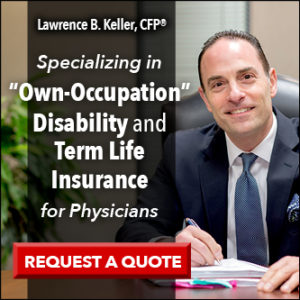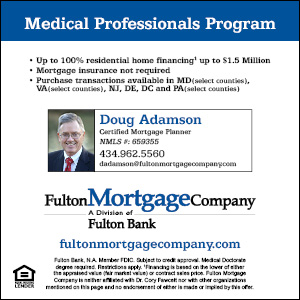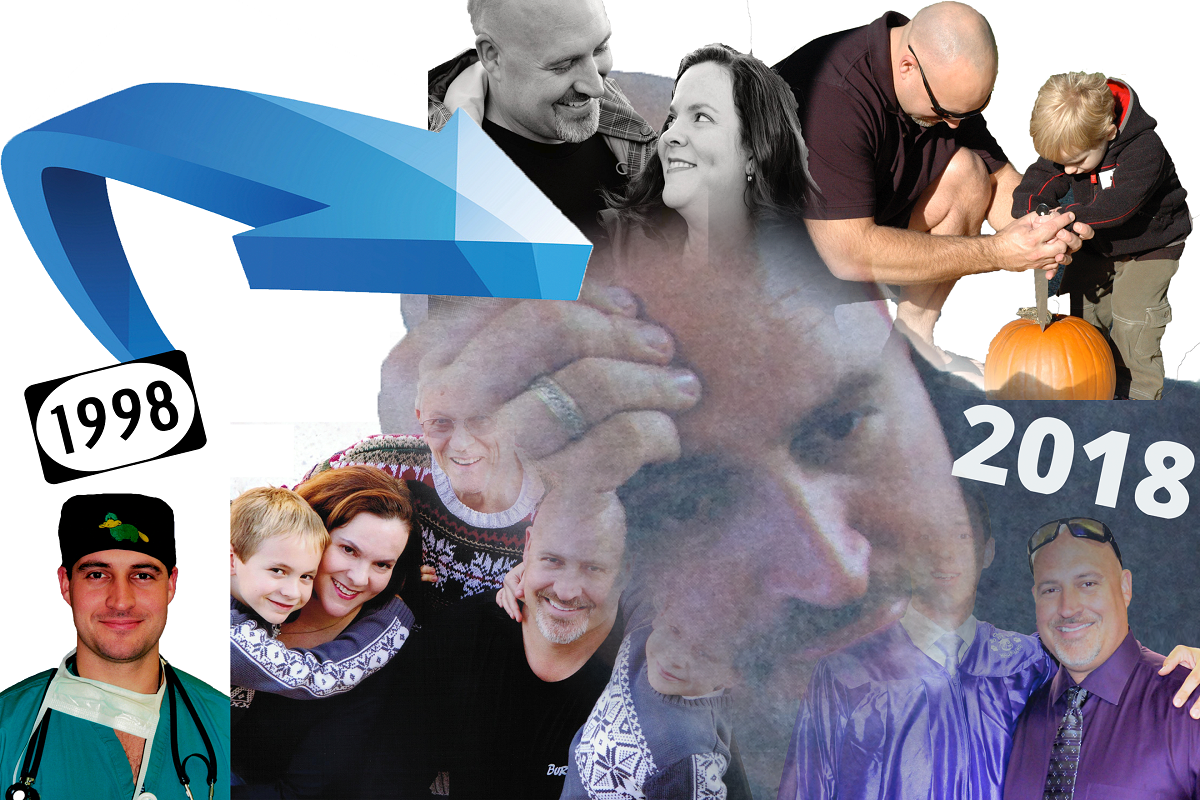Today we have a guest post from Christopher Yerington, MD, writing his personal story about the loss of his clinical career, disability insurance and the near insanity of being a physician disability claimant. May you find his tale very insightful.
In my late thirties, my left medial nerve had done as much as it was going to do for me in this lifetime and ceased functioning properly, robbing me of the good use of my left thumb and index finger. This ended my clinical career as a cardiac and trauma anesthesiologist.
The tragedy experienced under my poorly written group disability policy from an uncaring behemoth of a company is a warning that other physicians should heed. Physicians must have private individual disability insurance from one of the best companies, or their financial lives might just end in misery if they become disabled.
In 1998, as an Intern, I purchased Individual Disability Insurance. Leaving the academic world in 2006, I entered private practice, picking up a group disability policy as well. During 2009, I began to get weaker. First, I noticed it in the gym, when lifting objects above my head, then it began to make procedures and intubation more difficult. I figured I was getting older, working too much and sleeping less than I should, since I was also attending law school at night.
An orthopedic surgeon noticed me lift an irrigation bag to the top of an IV pole one day in September of 2009. He asked to examine my left shoulder. Not exactly sure of what the issue was, he ordered an MRI.
The MRI showed joint problems, lots of them. I had been a competitive swimmer, a martial artist and lifted weights regularly for years. It was time to pay the price for my athletics. Surgery happened a few weeks after the MRI. Everything went as expected, initially. Some atrophy is predictable during the surgical recovery, but the atrophy in my lower left forearm and hand was beyond anything I had ever seen in post-operative patients. The orthopedic surgeon and I were concerned, and neurology was consulted.
The Neurologist repeated my exam six times and used two different machines. He looked up at me. I knew, he knew. Silence. I finally said, “I will never practice clinical anesthesiology again.” The EMG showed chronic permanent damage of my left median nerve. Full neurological exams and multiple EMG’s eventually showed deficits in the left lower leg and foot as well. I was told that I might need the use of a wheelchair later in life. The chronic nerve damage was thought to be the result of the neck and brachial plexus injury I sustained during my high forceps delivery 40 years earlier.
My last day of clinical practice was October 15, 2009. I went on disability in January 2010. My Group Disability Insurance Carrier had changed on October 1, 2009. It happens from time to time that one insurance carrier will sell an entire book of business to another carrier. In my group carrier’s haste to prepare documents, there were sections in my group policy that were, well, incomplete. My “Own Occupation Period” section was literally written, exactly like this, “USE CUSTOM WORDING.”
There were other more minor issues with the group policy contract, but without a definition for an own occupation period, it made the entire contract nearly impossible to interpret as every other section referred to this definition. Lawyers got involved. It boiled down to this, in order to receive my benefit from my group carrier with certainty, I could not finish law school and obtain another professional degree. Also, unfortunately, I could not earn even $1 without the possibility of losing the benefits.
I had just lost 43% of my income. My wife had to change jobs to keep health insurance for someone with a ‘progressive degenerative peripheral nephropathy’ and to give her flexibility to take time off work if my condition worsened. That caused her to lose 25% of her previous income as well. Now I was facing the choice of attempting to reboot my life and build a second career knowing that I could again lose another half my family’s benefit income, or I could just stop… stop everything and do nothing and collect the checks that provided for my family. I love my family, so I chose them over me.
I would learn in those next months that my group disability policy has written provisions defining ‘work’ or ‘employment’ in terms so loose they refer to ‘any job performed by any person anywhere that is paid.’ That meant I was on shaky ground even volunteering for the PTO at my kid’s school because there are school districts in America where PTO members get paid… hence, my group contract may consider that ‘work.’ Sounds totally ridiculous, right?
For my private practice colleagues, the group carrier ‘fixed’ the contract the following anniversary year on October 1, 2010. Yet, since I was a claimant, my ‘2009’ policy was set in stone from the date of my disability. I attempted to work with the carrier’s claims specialists… I’ve had seven, but anytime they mistakenly told me anything the insurance company didn’t like, they were removed from my case.
I continued to try to work with them, even fight with them. I just wanted an answer. My life was frozen, no forward motion was available because I could not increase my family’s income. One time I got to speak to a ‘senior claims specialist’ at the group carrier, and she promptly, by inadvertently copying me on an email, ‘teased’ me with, “maybe a settlement would be better for this guy.” She then redacted the message. Cruel or unimaginably incompetent, I cannot decide.
Knowing each day I was trapped doing nothing I felt was meaningful or purposeful or economically gainful in this world, was an unacceptable and unbearable burden. After being a physician, this was misery. I still attempted to be a great dad and husband, but the energy needed began to fade from my life. Was I having suicidal ideation? I am still not sure. I spent 30 days in intensive inpatient-outpatient therapy and another year in weekly groups and therapy… mostly trying to learn to live in my jail of a life.
My group carrier decided to not pay my next benefit check. When I finally was allowed to speak with someone, they said, ‘oops,’ it was a clerical error. I admit, I did not keep my cool on the rest of this phone call, but it ended with my claims specialist stating that, “you send us everything, it is too much to read. It would really be easier for us, Mr. Yerington, if you had died.”
I was convinced to sue my disability carrier in order to get the information on what would happen to my group benefit should I earn $1, or even $500 every month, so that I could make a plan for my life. My carrier refused to answer these questions stating they do not have to by law. After an 18-month process in Federal Court, under ERISA Law it turns out they are correct: legally they do not have to tell me anything. How’s that for closure?
You are probably thinking, just go out and work, you are a smart guy and you’ll make up the money easily. Would you risk losing another 50% of your income? Would you risk losing the home your children are growing up in?
In all that turmoil and personal horror, I eventually saw what I could do and then, what I wanted to do. You see, I’ve always been a teacher. I’ve never stopped teaching anyone who would listen about almost any subject since I was 10 years-old teaching swimming lessons at our community pool. Turns out that the one thing I now know a tremendous amount about is being a physician claimant on disability. I also know a bunch about general disability insurance, how a physician should protect their income, and how a physician can survive an amazing financial insult by understanding basic financial literacy.
When I first went on disability; I told my colleagues what happened… many of them then bought better disability insurance and increased their savings rates. I used my knowledge of business and law to help community start-ups and friends build businesses. I’ve watched some of them make good money, too.
After having major insurance carriers that sell disability insurance to physicians approached me, I got my insurance license and started my own company to teach physicians about insurance! I educate them on disability insurance, proper income protection, basic financial literacy, and advocate for them as claimants so they will not feel alone. These actions may result in generating income and will start another two-year legal battle with my group carrier which will likely cost my family hundreds of thousands of dollars in legal fees before it is ended.
That’s what has gone wrong. What went right? Well, I maintained 57% of my previous income. My wife and I had saved 20% of everything as well as maximizing our retirement contributions. We saved for our kids’ college. We were able to stay in our home, in our community, and live our lives. That is what disability insurance is supposed to be for and what I feel empowered to teach with compassion and experience to other doctors.
Dr. Christopher Yerington retired from clinical anesthesiology due to his own disability in 2010. Because his disability policy did not cover him like he thought it would, he now spends his time educating medical groups and residency programs about the importance of great disability coverage. He resides in Columbus, Ohio. We have no financial affiliation. You can contact him through one of the sites below:
Doximity: https://www.doximity.com/pub/christopher-yerington-md
LinkedIn: https://www.linkedin.com/in/chrisyerington/
If your career in medicine has come to an abrupt end, please read The Doctors Guide to Smart Career Alternatives and Retirement, it may help you find a new direction.


Doctor,
At around age 50, I fell from a step-ladder and fractured my calcaneus. I am an orthopedic surgeon so standing and physical exertion are fairly essential. With fracture healing, followed two years later by the inevitable sub-talar fusion I spent months on crutches, which does influence patients regard for your ability.
I had “own occupation” coverage with a top-ranked private firm. The application and documentation process was so humiliating that I just gave up. I could scrub standing on one leg. I could sit on a stool for some procedures. My total joint practice walked away. Maybe I should have gotten a lawyer but the process was so intrusive, I never collected a dime, after 20 years of paying top dollar for the policy. Maximum payment possible was $6000 monthly, pre-tax. Wow…
Michael,
For two years I have been giving advice one-to-one physician-to-physician and weekly, if not daily I am contacted online with stories of plain expectation failure on the part of disability insurance. Your advice of buy only true own-occupation, from a trusted agent or attorney and pay with post-tax money from the beginning are core educational points I make to all young physicians.
We doctors are sold one thing by financial representatives (with an expectation of own-occupation) and then we are stuck usually decades later, if disabled, with the reality of any-occupation language. I am sorry for the loss of your career. I loved practicing medicine. Thank you so much for adding to the conversation!
~Chris
It was just dumb luck…my hairdresser’s life insurance agent sold me a disability policy with an “own occupation” rider. I paid hundreds of dollars a month while my partner bought a cheap policy without the “own occupation” rider. At 48 years old, I developed bilateral sciatic nerve injuries that preclude my sitting more than 2 to 3 hours a day, and that ended my psychiatric practice. I loved practicing psychiatry! However, it wasn’t long before I realized that I could work part-time doing forensic psychiatry and make money in addition to my disability payments, BECAUSE of the own occupation rider. Forensic psychiatry was not my occupation when I took out the disability insurance. Forensic reports require an interview, but after that, it is record review and report writing which can be done in bed if necessary. I still grieve the loss of my work with patients, but at least I am not paying a horrible financial price as well.
In 2003, the central vision in one of my eyes dropped out while I was examining a patient that was to have cataract surgery by me the next day. The vision loss was due to a steroid shot my rheumatologist gave me for a flare-up of rheumatoid arthritis. Had retinal laser, cataract surgeries, etc, but vision loss remained & I had to sell a solo practice & retire. Without any reassurance from the disability insurance company. The company picked a second opinion from an academic eye doc in San Francisco & then told me that the expert doc colluded with my academic retinal doc in LA.
Here’s what I learned: 1) get own occupation rider 2) If you are not sure about buying disability policies, hire a disability lawyer for a consult to guide you & 3) if you are paying disability insurance premiums through your corporation & want to switch so that you are paying the premiums personally, do more than just switch checkbooks. Notify the company in writing that you are switching to pay the premiums personally. Saves a lot of headaches.
I, too, have had to retire from a tremendously rewarding successful career due to an unforeseen tragic onset of Charcot Marie Tooth hereditary peripheral neuropathy. That was a tough year on Wellbutrin. Selling and moving out of my practice, saying goodbye to patients of up to 30 years…. but I am not crying in my soup because decades ago I told my office manager to apply for any dsb policy that crossed our desk. So I am more covered than most. The caution I’d give young docs, while encouraging them to plan for the unthinkable, is to obtain only OWN OCCUPATION policies. It is unforgivable that my biggest policy- issued by the AMA!!!!- is what’s called “earned income” thereby relegating me (as with the original author here) to a sentence of inability to be employed lest I lose my dsb income….. buyer beware
Laurie,
Thank you for your comment, I cannot say it better myself: “The caution I’d give young docs, while encouraging them to plan for the unthinkable, is to obtain only OWN OCCUPATION policies.”
It is terrifying enough to contemplate the unthinkable but then to have it go all wrong after losing the career you love… it is soul-crushing. I am glad you had the business-smarts to obtain some disability insurances along the way. Sadly, graduating resident rates of individual own-occupation disability insurance are falling.
I am still acutely aware that when I do earn income again I will have another legal battle on my hands to understand what that means in my mis-written ill-constructed group disability policy. However, my family comes first and as much as raising my kids has been an absolute blessing during this ordeal, part of raising kids properly is teaching a work ethic so they can provide for themselves and their families to come. In a couple years I hope to write a victory piece on Dr. Fawcett’s website!
~Chris
Will not bore you with the details but , due to trusting to good health and a company recomnended and partially subsidized LTDI policy, my outcome was similar to the author’s. While my situation did not include depression it certainly could have, especially when I was informed that I had to pursue obtaining SSDI from the government to offset what the private insurance would have to pay. Further, they were able to walk away entirely once I were to become old enough to apply for Social Security. What physician who truly loves their profession retires at 65??? The end result was that even though I prepared for the eventuality of a disability preventing me from working by purchasing a LTDI policy, it did me very little good. Beware of which policy you choose. Have an attorney who is well versed in this field specifically review the policy in detail.
Susan,
Thank you for adding to the conversation. My own SSDI process took more than 30 months and was among the most ridiculous and purposely denigrating undertakings of my life. It has taken a herculean effort to find and retrain myself. I fear I will never love any job as much as clinical anesthesia. However, Physician-Finance advocates like Dr. Cory Fawcett have helped me greatly to see both the impact of proper information and advice on today’s young physicians. I focus on the foundations of financial protection and savings because without that start, too many doctors end up in their mid-forties wondering what went wrong. I am sorry for your ordeal, as well as mine, but know I am tirelessly trying to reach every one of our future colleagues in training and get them into their careers properly.
~Chris
Dr Yerrington,
I am Nancy Moten Singer, the wife of Joe Singer who had to stop working due to progressive disability. Leaving medicine before I was psychologically ready was the hardest decision I have ever had to make. I had private disability insurance and as my husband stated I wanted to cancel it about a year before the onset of my illness. I thought I would never become disabled. I was healthy and strong and always had been. Fortunately our insurance agent knew us well, we met him when we were interns. He counseled me not to cancel. He did recommend we increase my benefit to more closely match my income at the time- but I was not convinced. I have some regret that I did not heed his advice. But moreover, I am grateful that he convinced me that the likelihood of disability was far greater than death. And so we continued to insure a portion of my income. We work with a wonderful insurance company and have never had any difficulties in dealing with them. This income has certainly helped my family financially over the years.
Good luck with your ongoing work.
Nancy Singer
Nancy,
Thank you very much for your words here on this thread. As powerful as our two tales may be, disability insurance is simply not well understood… I have found teaching disability insurance to young physicians and residents interesting (from an instructive point of view). I used to teach thoracic anesthesia and one lung ventilation – that was my speciality and I gave great fun lectures. Like disability insurance, there is the easy to understand portion but then there is a difficult to really internalize as part of how to be safe and secure in the practice of thoracic anesthesia.
At first I tried to teach doctors by only telling my story… many of them went out and bought better disability insurance or increased their benefit amounts. This was before I started my business or got my insurance license. After I was introduced to the insurance-selling side of things and had companies eager for me to work for them… I simply did not like their approach to teaching doctors… but I learned to ‘sell’ from many of them. Yet, that approach didn’t work for me and it didn’t work for my clients. It rang false in some ways to me… perhaps what many doctors despise about the financial representation world of today. It felt that in myself.
The reason I decided to be completely independent was the education of my colleagues was the most important part to me. Working one-on-one physician-to-physician allowed me to tell my story to them alone, letting them add their own worries about their life to the discussion and my ‘more than I ever wanted to know of the physician disability world’ knowledge allows me to advise and advocate for them to be optimally protected, for their careers and for their lives.
After medicine, I really never thought I would get that, ‘I love what I do’ feeling again. I really loved anesthesiology and I was really good at my job. It has taken eight years but one client at a time, I am finding a new passion, a new drive and a new job I am growing to love.
I’m really glad you listened to your advisor and kept that policy!
~Chris
That was such a tragic story to read and I am sorry you had to go through that.
As physicians we sacrifice our time, our lives, etc to help others but when it is our turn to need help you see how society/rest of the business world treats us.
I cannot believe that the official contract signed had the words “use custom wording” in it. That should have been enough to force the insurance company to admit their mistake of not properly disclosing the terms of the contract and they should honor yours like they did for the rest of your group later on.
Xrayvsn,
Yes, I am sorry I went through it, too. Ironically, it was the inability to use the legal system to get any kind of resolution, understanding or modicum of justice that ignited my desire to teach again and to teach young doctors to be better and more prepared than I was.
Thank you for commenting,
~Chris
Dr. Yerrington,
I am so sad for you that you had to leave medicine, but glad for you that you have the fortitude to keep on. I am a pediatrician in RI and my wife is a pediatrician who had to stop working because of a disability. It was heartbreaking for her. Right before she got sick, our insurance guy convinced us to not get rid of our private disability, which we were considering. We managed to get about 25% of her pre illness income from a great company. I agree with you that doctors should get personal/private disability and cover as much of your income as you can. I/we can give you a testimonial for disability insurance.
Good luck and thank you,
Joe Singer
Joe,
Thank you so much for commenting. Each and every young physician, resident and medical student who learns from my life’s experience assists in my own healing. I am sorry to hear of your wife’s illness and disability. Joe if you would like to write a short story of your and your wife’s experience, I would be honored to utilize it specifically when I speak to pediatric residency program and generally, for doctors questioning whether or not to keep a great individual disability policy. Thank you for sharing and adding to the discussion!
~Chris